October 24 – UN Day: Tajikistan and United Nations relations history
Dushanbe, 24.10.2016. /NIAT “Khovar”/. 24th October has been celebrated as United Nations Day since 1948. The United Nations is an international organization founded in 1945 and currently made up of 193 Member States. On 29 January 1992 UN Security Council unanimously accepted in its session a resolution with regard to the General Assembly’s recommendation to accept the Republic of Tajikistan to the membership of the Organization. On 2 March 1992 in 46th Session of UN GA the Resolution 46/224 about acceptance of the Republic of Tajikistan to the UN was unanimously adopted. On the occasion of the 71st anniversary of UN foundation we publish the history of the development of relations of our country with this influential international structure, provided by the Ministry of Foreign Affairs of the Republic of Tajikistan.
The country’s joining to Nations Community laid fundamental basis to develop its cooperation with the specialized organizations and institutions of UN. For a short period of its membership in Organization Republic of Tajikistan took some steps in relationship with the UN. As we know, as a result of domestic situation in the Country, the cooperation for the achievement of peace and stability was a priority for Tajikistan.
UN Representation in Dushanbe — UN Mission of Observers to Tajikistan was opened on 1 February 1993. The activities of UN Mission of Observers to Tajikistan (UNMOT) secured progress of peace process in Tajikistan, assistance to the peacekeeping efforts and providing urgent humanitarian aid.
As a result of implementation of the General Agreement on Establishment of Peace and National Accord in may 2000 on the basis of UNMOT, The UN Tajikistan Office of Peace-Building (UNTOP) was set up by the initiative of UN General Secretary Koffi Annan. The main tasks of UNTOP were to promote development and strengthen the political foundations, internal peacebuilding mechanisms and the ability of the state and society to prevent and resolve conflicts. In August 2007 the UN Tajikistan Office of Peace-Building successfully completed its work. Dozens of participants of this mission were awarded with high awards of the Republic of Tajikistan. The model of Tajikistan for national reconciliation with assistance of the UN and guarantors countries is an example of preventive diplomacy for countries where there are internal conflicts.
As the successful implementation of the objectives defined our priorities of cooperation, Republic of Tajikistan seeks to play an active role in global political and economic processes, shows the strong commitment of the objectives and principles of the UN Charter, and the International Law. Tajikistan is also the coauthor of the various international initiatives in the field of strengthening peace and stability in the issues of disarmament and nonproliferation regimes. Signed on 8 September 2006, Treaty on the nuclear-weapon-free zone in Central Asia entirely consistent with the country’s efforts to prevent proliferation of nuclear weapons, contributes to the strengthening of regional security, enhanced cooperation among members, and to the peaceful use of nuclear energy. Republic of Tajikistan supports the UN’s leading role in the fight against the illicit trade in small arms and light weapons and attaches great importance to the implementation of the programme for prevention and elimination of illicit trade in small arms and light weapons in all its aspects, to the strengthening of international cooperation in eradication of illicit brokering and illicit production of small arms and light weapons, as well as ensuring effective stockpile management. Tajikistan fully supports the desire of the international community to achieve the complete prohibition of antipersonnel mines, performs basic provisions of the Convention on the prohibition of the use, stockpiling, production and transfer of anti-personnel mines and on their destruction (the Ottawa Convention), annually submits to the UN Secretary General information about the state of the threat of landmines. Republic of Tajikistan ensured the destruction of all antipersonnel mine reserves, located on its territory. Tajikistan is a supporter of the Central Asia free mine zone, and encourages in cooperation to take practical measures to clean the mined area of the region, to solve other problems associated with the consequences of mining. Republic of Tajikistan strongly and unequivocally condemns international terrorism in all its manifestations, stands for consolidation of efforts of the international community at the global, regional and national levels. Tajikistan supported the UN resolutions № 1267, 1373, 1540, 1566, 1617, and other UN Global counterterrorism strategy. First in 2008 citizens of Tajikistan joined the ranks of the UN peacekeeping forces to contribute to the achieving peace in Darfur.
The adoption of resolution on the declaration 2003 the international year of fresh water proposed by the initiative of the Republic of Tajikistan was an important milestone in the history of cooperation with UN. Based on the results of the international year of fresh water the UN Secretary General has established Advisory Board on water and sanitation. The awareness of all complex of problems related to the water resources and to role of UN in mobilization of political will of all Countries for resolving these problems induced Tajikistan to speak with the initiative on announcement of the international decade for action “water for life”, which started on 22 March 2005. Now this day is celebrated as international water day. In the continuation of these efforts in 2010 in Dushanbe was held the International fresh water forum on the proposal of the President of Tajikistan Emomali Rahmon, made in the course of his participation at UN summit 2005. In the course of the forum, the practical implementation of coordinated “International water agenda” was jointly assessed by participants. In order to contribute to the international decade for action “Water for life”, Republic of Tajikistan together with Japan, Holland and Germany initiated holding of special events “Water and sanitation for all”, supported and approved by the human rights Council resolution “Human rights and the access to safe drinking water and sanitation” in 2008. This resolution contributes to the implementation of the program Millennium development goals in accordance with it by 2015 the proportion of people, who don’t have permanent access to the clean drinking water and to the main sanitation facilities intends to be halved. The Government of the Republic of Tajikistan successfully held in 2008 the international conference on reduction of water-related disasters. In addition, on August 2013 in Dushanbe took place the International high-level Conference on water cooperation. During the 63rd UN General Assembly the President of Tajikistan Emomali Rahmon addressed with a proposal to all member States, and international organizations to create a specialized group or the UN Commission on coordination of activities addressed to resolve the problems of the Aral Sea basin, proposed draft resolution of the UN General Assembly to provide observer status to the “International Aral Sea Rehabilitation Fund” at the UN, which was adopted at the 63 session of the UN General Assembly. Also in 2010 with the initiative of the Republic of Tajikistan initiator-countries of the International year of fresh water, and International decade for action “Water for life 2005-2015” a new General Assembly Resolution on “International year of water cooperation-2013” was adopted. Putting forward It’s initiatives in this sphere, Republic of Tajikistan proceeded from the understanding that, the resolving of the water management problems at the national, regional, and international levels involves a complex combination of adequate support from the side of international community, and the national efforts of the countries, that faces problems on the water resources provision.
An important stage of cooperation between Republic of Tajikistan and United Nations was UN Secretary-General’s visit to the Country on 5 April 2010. Ban Ki-moon had talks with the President of the Republic of Tajikistan Emomali Rahmon, and got acquainted with the course of construction of hydroelectric power stations, being under construction on the Vakhsh River during his visit. In their discussion of issues President and the UN Secretary General focused on the realization of “Millennium development goals”, reducing the impact of the crisis on Tajikistan, and elimination of obstacles on development of regional cooperation in Central Asia.
Realization of the economic and humanitarian components of cooperation between UN and The Government of Tajikistan is carried out through the United Nations development programme (UNDP) in Tajikistan. The UNDP Representation in Tajikistan was established in December 1993, in the same year, the agreement between the Government of Tajikistan and UNDP, which established a legal framework for organization activities was signed. Because of complicated and unstable political, social situation in the Country, UNDP activities basically were focused on rendering humanitarian aid that was the immediate response to the needs of the Country. The activities were carried out also in the sphere of strengthening of peace and stability, assistance in development of small enterprises and their management. UNDP focused it’s activities on the realities of postconflict time, and reviewed the main projects and programs, when the General agreement on establishing peace and national reconciliation was reached, and Country formated on the way of stable prosperity. The framework agreement originally approved for the period 1999-2000, and further prolonged until 2004, then the previous stage of cooperation between Tajikistan and UNDP determined with the new program for the Country in 2005 2009, which was an integral part of the concept of providing assistance to Tajikistan. Later, the cooperation was established, in accordance with the United Nations Development Action Framework (UNDAF), and the Country Programme Action Plan (CPAP). UNDAF aimed at solution of problems in the following areas: poverty reduction and effective management, food security and nutrition, fresh water, sustainable environment, energy and the quality of main services. The budget of the Framework for the 2010-2015 was $281mln., i.e. about $47mln. in a year. Working out UNDAF guided by the Millennium development goals, and the tasks outlined in the national development strategy of the Republic of Tajikistan, and the poverty reduction strategy, thereby brought them into a single Executive structure of development initiative. UNCPAP represents a wide range of activities within five direction: poverty reduction and achievement of Millennium development goals, reducing the burden of AIDS, malaria and tuberculosis, effective management, crisis prevention and recovery, environment and sustainable development. The general planned budget of UNCPAP for the 2010-2015 was $166mln.306 thousand, including more then $35mln. of the own funds of UNDP. On the basis of realities of the created situation and the recommendations of the government UNDP activities were focused on the long-term projects aimed at sustainable development and national economic recovery of the Republic of Tajikistan. We can enumerate, the current and the execution of the programs: The Central Asia Drug Action Programme (CADAP), Border Management Programme in Central Asia (BOMCA), the national development strategy, accelerate the achievement of the Millennium development goals, improved access to the local infrastructure, capacity development for entrepreneurship, strengthening disaster preparedness in Zarafshan Valley, support to sustainable transport management of Dushanbe City, development of renewable energy sources in rural areas of the Country, and many other programs.
In May 2011 UN Deputy Secretary-General, the United Nations development programme administrator Helen Clark had a tour of Central Asia. During the tour Helen Clark arrived Tajikistan for a three-day visit. During her visit Helen Clark had a meeting with the President of the Republic of Tajikistan Emomali Rahmon, and the Foreign Minister Hamrokhon Zarifi. A wide range of issues on Tajikistan-UNDP cooperation were discussed at the meetings. The talks focused on stable socio-economic development of Tajikistan, and implementation of Millennium development goals. They discussed issues of removing barriers on a way of development of regional cooperation in Central Asia, and also the issues of strengthening security in the region.
In 1993 the Office of the United Nations High Commissioner for Refugees (UNHCR) bigan it’s activity in Tajikistan. At first assistance in voluntary return of tajik refugees from Afghanistan, and CIS, assisting them in the process of rehabilitation, involvement in various projects and programs were the main tasks of UNHCR. Thus the total sum, used by UNHCR reached more than $32 million. Currently UNHCR mandate in Tajikistan is limited by assistance to the based in the country afghan refugees, legal protection, payments of benefits and organization of training programs.
United Nations International Children’s Emergency Fund (UNICEF) began it’s Activity in Tajikistan in August 1994, when the Cooperation agreement with the Government of Country was signed. The cooperation program for the Country between the Government of the Republic of Tajikistan and UNICEF for 1995-1999 was directed to the infant and maternal mortality reduction, improvement of learning conditions of children, raising awareness among young people on HIV/AIDS problems and healthy lifestyle promoting. In 1997 in the framework of the program, the national coordinating Committee on the prevention of the spread of HIV/AIDS was established. The Committee composed of representatives of various ministries and departments, local NGO representatives and UNDP under the guidance of Deputy Prime Minister of the Country. In April 2000 the second Program for the Country and the Major action plan for 2000-2004 was signed. The Program had include such projects as rendering assistance to the government of the Republic of Tajikistan and it’s partners in protection of the rights, ensuring the development of the child, elimination of discrimination of women and children and etc. In 2001 with the support of UNICEF and recommendation of the UN Committee on the rights of the child the national Commission on the rights of the child was organized in Tajikistan. In the framework of partnership with the global Alliance for vaccination and immunization UNICEF supplied vaccines for implementation of the national program of immunization. As a result of this, vaccination coverage against measles and the complex vaccination reached 84%. With the support of the Japan’s health Ministry, US and WHO centers for the elimination and prevention of diseases, Tajikistan was referred to the category of the polio-free countries. With the support of US centers for the elimination and prevention of diseases and United States Agency for International Development (USAID) also was developed plan of measures to ensure reliable monitoring for infant and child mortality. All salt iodization law was adopted In 2002. UNICEF exerted efforts to ensure vitamin A all children up to five years in the framework of the campaign on liquidation of lack of vitamins in 2003, contributed to the rebuilding of the activities of children’s homes. Content of the UNICEF third program for Country in 2005-2009 subject to the provisions of the UNICEF medium-term strategic plan, agreed with the Government of Tajikistan and partners in the UN in December 2003 during the national conference on the issue of child was approved in 2004.












 Starlink Satellite Internet Launches in Tajikistan
Starlink Satellite Internet Launches in Tajikistan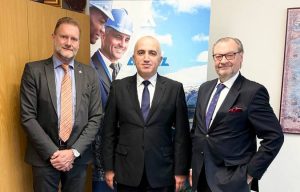 Austrian Company Andritz Hydro Seeks to Expand Cooperation with Tajikistan
Austrian Company Andritz Hydro Seeks to Expand Cooperation with Tajikistan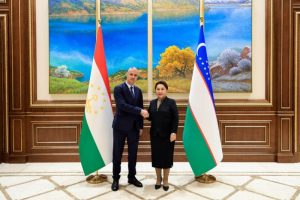 Ambassador of Tajikistan Meets with Chairperson of the Senate of Uzbekistan
Ambassador of Tajikistan Meets with Chairperson of the Senate of Uzbekistan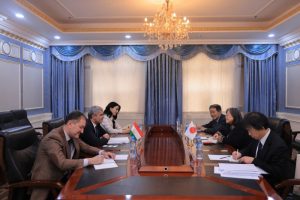 Tajikistan and Japan Discuss Cooperation within Regional and International Organizations
Tajikistan and Japan Discuss Cooperation within Regional and International Organizations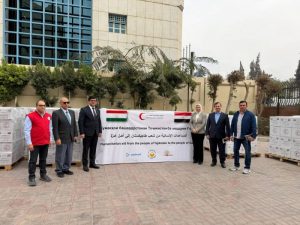 Tajikistan’s Humanitarian Aid to the People of Gaza
Tajikistan’s Humanitarian Aid to the People of Gaza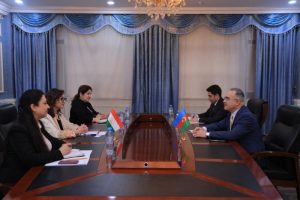 Bilateral Cooperation Between Tajikistan and Azerbaijan Discussed in Dushanbe
Bilateral Cooperation Between Tajikistan and Azerbaijan Discussed in Dushanbe Tajikistan Establishes Data Protection Center to Strengthen Cybersecurity
Tajikistan Establishes Data Protection Center to Strengthen Cybersecurity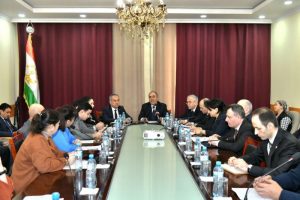 Center for Strategic Studies of Tajikistan Expands International Cooperation Network
Center for Strategic Studies of Tajikistan Expands International Cooperation Network Coins Dating Back to the 1st Century AD Discovered in Tajikistan
Coins Dating Back to the 1st Century AD Discovered in Tajikistan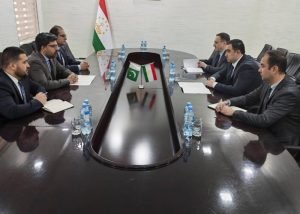 Trade Turnover Between Tajikistan and Pakistan Reaches $43 Million in 2025
Trade Turnover Between Tajikistan and Pakistan Reaches $43 Million in 2025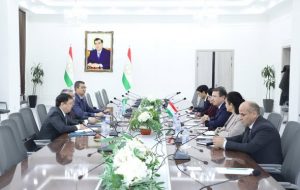 Days of Kazakh Medicine to Be Held in Tajikistan in 2026
Days of Kazakh Medicine to Be Held in Tajikistan in 2026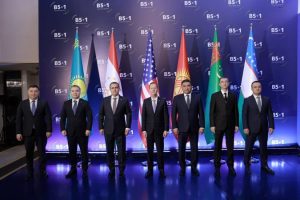 Tajikistan Highlights Investment Potential at B5+1 Forum in Bishkek
Tajikistan Highlights Investment Potential at B5+1 Forum in Bishkek














